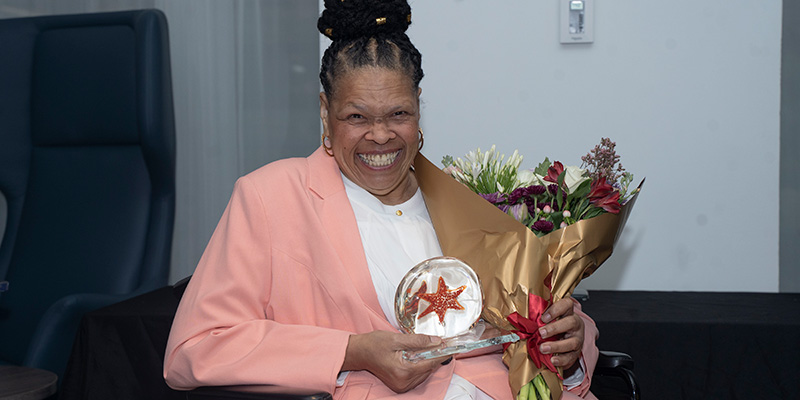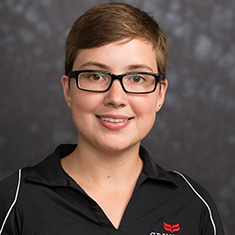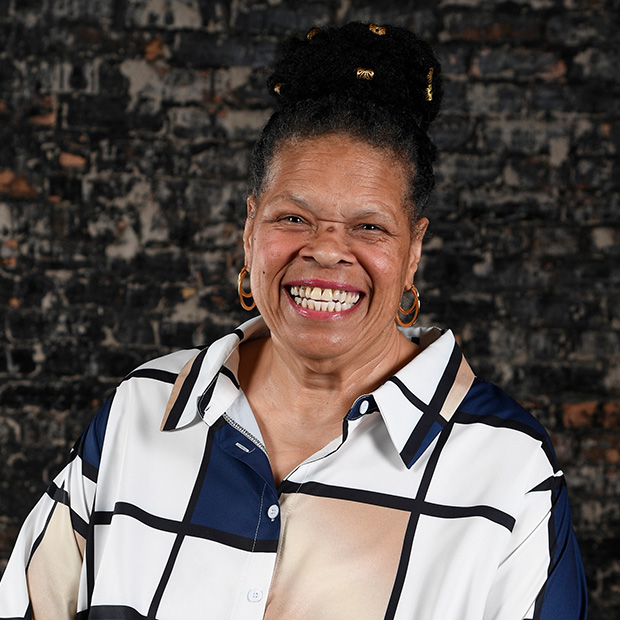Grinnell alumna presenting education in disability culture through short films
September 21, 2023 — The next time someone tells you that art can’t change your life, tell them about Vanessa Harris ’76.
Just five years after taking a documentary film class on a whim, Harris received the prestigious Leaders for a New Chicago Award this summer for the profound impact that Harris’ organization, the Strategy for Access Foundation, has made in producing short videos celebrating and informing Chicago’s vast disability community. Harris joins Dixon Romeo ’15 and Damon Williams ’14 as recent Grinnell College alumni recipients of the award.
 Vanessa Harris ’76 smiles after receiving the prestigious Leaders for a New Chicago Award this summer. Photo by He Shoots Lyfe.
Vanessa Harris ’76 smiles after receiving the prestigious Leaders for a New Chicago Award this summer. Photo by He Shoots Lyfe.
Given jointly by the Field Foundation and the MacArthur Foundation, the award recognized not only Strategy for Access Foundation’s growing collection of short films and videos, but also how Harris is offering “an education in disability culture, to ensure that they are creating projects that are respectful and empowering to disabled people.”
As someone living with disabilities, both visible and invisible, Harris says that creative solutions have been a critical life skill. “I’ve always been a problem solver because I’ve always had disabilities, and they lead me to come up with solutions that other people may not. Many people with disabilities have to do the same thing because no one is looking out for them.”
Autumn Wilke, Grinnell College associate chief diversity officer for disability resources, has worked closely with Harris the past three years as a member of the Strategy for Access’s Board of Directors.
 Autumn Wilke
Autumn Wilke
“Vanessa is a go-getter and is one of the most talented networkers I have worked with,” Wilke says. “Vanessa’s ability to create connections with others and build coalitions to improve the work of Strategy for Access is impressive. If you have a single conversation with Vanessa about access work and the arts, Vanessa’s passion is both clear and contagious.”
Several Grinnell students and alumni have interned at Strategy for Access including Elizabeth Zerez ’22 and Abby Lynch ’24. Harris is hopeful that there might be more Grinnellians interested in getting involved in some capacity be it as an intern, volunteer, or board member.
As a Grinnell student, Harris hosted a radio show on KDIC that developed a devoted following particularly with a segment playing female-identified artists from A to Z. “People were waiting to hear who I was going to come up with for the next letter in alphabet,” Harris says with a boisterous laugh, which continued as Harris recounted the calls from critics who’d call up KDIC to say, “you really messed up, you missed this person!”
When Harris was not spinning records, writing stories for the Scarlet & Black, or taking photos for the yearbook, you could find Vanessa in the Science Center. Since Grinnell didn’t have a concentration in environmental science at the time, Harris studied chemistry. Overall, Harris remembers chemistry as a very challenging experience including a spring break spent in the lab trying to catch-up in Advanced Organic Chemistry.
Many of Harris’ classmates were intent on medical school, but Vanessa had different plans. Harris’ interest in the environment traced back to high school Earth Day research projects and a father who served as Cook County Commissioner of Buildings, Zoning, and Air Pollution.
Vanessa credits Professor Rogers Gurira with steering Harris toward a career in environmental engineering. “Professor Gurira had a very strong influence on me,” Harris says, recalling a research project looking at ways to measure and treat selenium in drinking water. “Professor Gurira would say ‘Have you thought about this? What about that?’” Those questions prompted Harris to think about the work more broadly and from unconventional approaches.
 Vanessa Harris ’76,
Vanessa Harris ’76,
photo by Devin Wideman.
All the hours in the lab paid off when Harris got to graduate school in engineering at the University of Illinois in Champaign-Urbana. The environmental classes were filled with chemistry. “I was ahead of the game because I’d paid attention as an undergrad,” Harris says, “I was ready, and I owe it all to the professors at Grinnell.”
After graduating, Harris worked at Argonne National Lab doing environmental impact studies on nuclear and coal-fired power plants. Much of Harris’ work took place working for several environmental engineering firms. Later, Vanessa worked for British Petroleum, AECOM, the Metropolitan Transit Authority in Houston, and took on consulting projects.
Harris had been prepared to pursue a Ph.D. in the mid-2010s, however after being accepted to a program, the faculty member Harris had hoped to work with withdrew the funding without notice. Soon after, Harris’ doctor said, “Vanessa, go and do something else for a few weeks. Do not think about this.” That something else turned out to be the documentary film class at the Hyde Park Arts Center. “And here I am 120 videos later,” Harris says.
Currently Harris is working on a video series for the city of Chicago, funded by the U.S. Department of Commerce, that highlights more than 15 cultural attractions and institutions in the city with high marks for accessibility.
“The videos created are available via Chicago Access Network Television making them available to the entire network viewership of 1 million people,” Wilke says. “This ensures that the important content designed to improve the lives of disabled people is free and publicly accessible.”
In terms of long-term production goals, Harris would love to make a live-action musical, in the spirit of Encanto, starring people with disabilities.
Even though many people will experience a disability in their lifetimes – be it temporary or permanent – too many people “don’t consider what we experience until they deal with it themselves,” Harris says.
If there’s one thing that Harris wants people to be more cognizant of, it’s inclusion. “I want people to know that people with disabilities need to be included in everything,” Harris says, “a phrase that comes up in disability advocacy is ‘Nothing about us without us,’ which means include us in the decision-making.”
— by Joe Engleman ’14